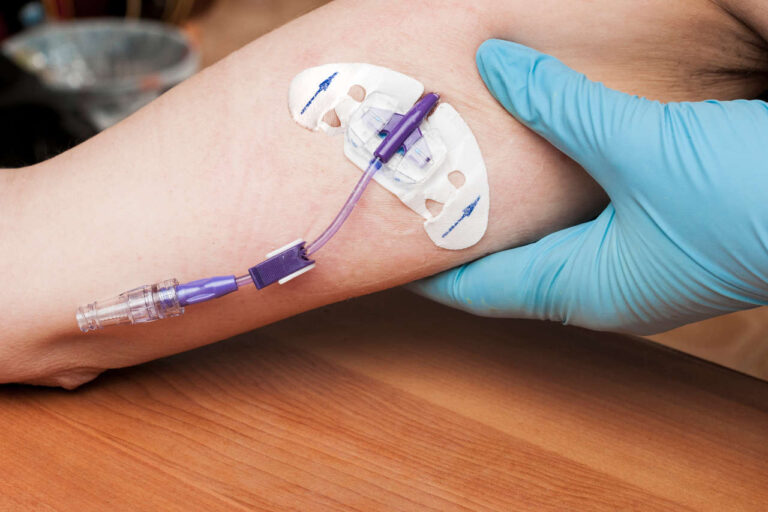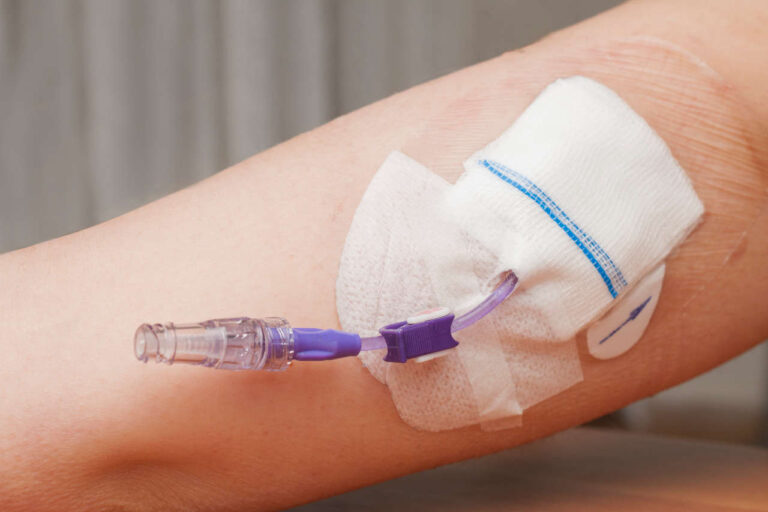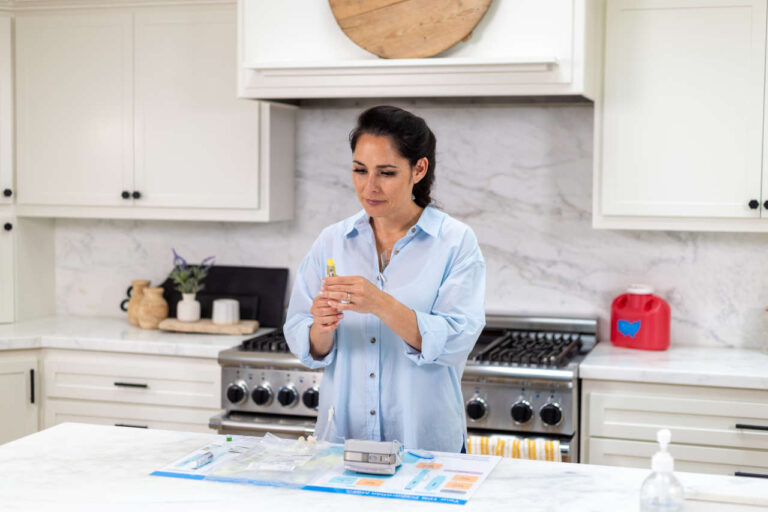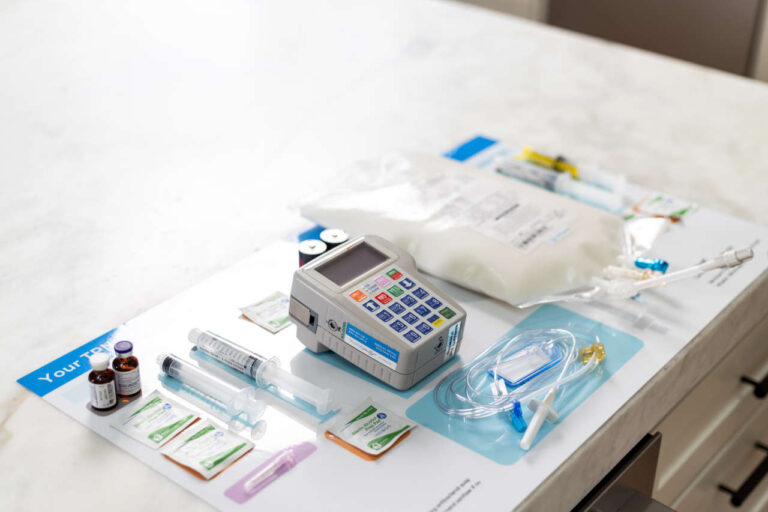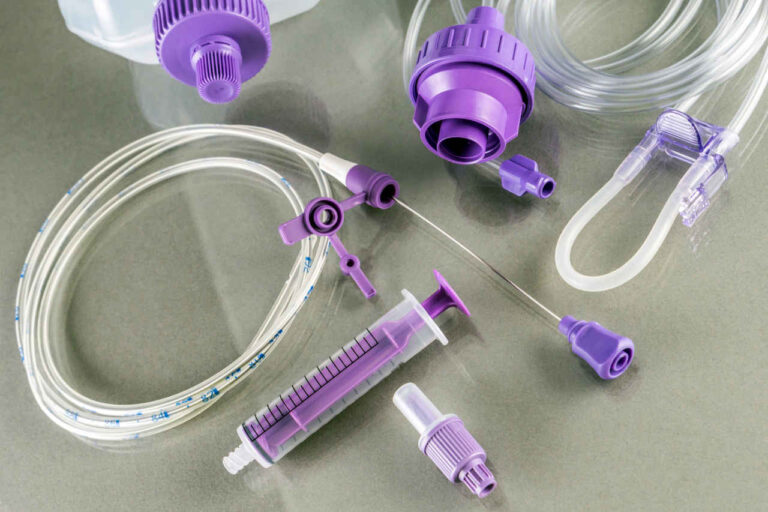
Clinimix is a preformulated total parenteral nutrition (TPN) intravenous formula. It provides nutritional support to patients who are unable to obtain adequate nutrients orally due to gastrointestinal dysfunction or other illnesses. The purpose of TPN is to fulfill the nutritional requirements of patients. TPNs can differ in their composition and storage requirements. This article discusses the key differences between Clinimix and a customized TPN and when each type of formula is suitable for patients.
Ask About TPN Home Infusion
Clinimix vs. TPN: A Basic Understanding
What Is Clinimix?
Clinimix is a brand name for a premixed total parenteral nutrition solution manufactured by Baxter Healthcare. It is a ready-to-use nutrition solution formulated with up to 80 grams of amino acids per liter. Clinimix specifically provides macronutrients (amino acids and dextrose) and micronutrients (electrolytes) by intravenous infusion.
It is a nutritional premix containing essential ingredients that can be used as an alternative to customized TPN. This makes Clinimix a convenient option for healthcare providers to choose Clinimix formulations for patients who require moderate to high protein content.
What Is TPN?
Unlike Clinimix, TPN is a customized formula that can provide more nutrients such as carbohydrates, proteins, fats, vitamins, and minerals to patients intravenously (through veins) in a balanced ratio. The formulation of total parenteral solution is determined by healthcare providers or pharmacists according to the patient’s complex nutritional requirements.
Clinimix vs. Custom TPN: Key Differences
Clinimix and custom TPN differ in various aspects, such as indication (usage), composition, storage, and contraindication.
Indication
Clinimix is given when patients require moderate to high sources of calories and protein. Their diet does not provide enough calories and protein, usually due to certain illnesses or recent surgery. Clinimix comes in various formulations and can contain up to 80 g/l of amino acids. It is also used in critically ill adult patients with significant lean body mass in the first 7 – 10 days of ICU stay. Clinimix aims to reach patient protein targets to meet their nutritional goals.
Moreover, Clinimix treats patients with negative nitrogen balance in the blood.
Unlike Clinimix, TPN is used for patients who require complete nutritional support when oral or enteral feeding is not feasible or contraindicated. It is often indicated for patients with severe malnutrition, gastrointestinal disorders, or those undergoing major surgeries.
Composition & Formulation
The composition and formulation of Clinimix are different from that of TPN. Clinimix is available in fixed formulations and concentrations and cannot be customized. Currently, Clinimix is available in two forms:
- Clinimix: This formulation contains macronutrients like proteins in the form of essential and non-essential amino acids and carbohydrates (dextrose).
- Clinimix E: This formulation contains essential and non-essential amino acids with electrolytes and dextrose with calcium.
Clinimix is available in 1 and 2 liters of volume with fixed formulations of 8/14 (8% amino acids and 14% dextrose), 8/10 (8% amino acids and 10% dextrose), and 6/5 (6% amino acids and 5% dextrose) for central and peripheral infusions.
In contrast, TPN is a custom-prepared solution that contains a precise balance of carbohydrates, proteins, fats, vitamins, and minerals tailored to meet the specific nutritional requirements of individual patients.
Storage
Clinimix is stored at room temperature (25°C/77°F), while TPN is stored in the refrigerator at a temperature of 2 – 8°C.
Availability
Since TPN is a custom-prepared solution, it is typically prepared by pharmacies within hospitals or specialized compounding facilities.
On the other hand, Clinimix solutions bags are commercially available to be dispensed by pharmacies.
Speak to a Specialist About Copay Assistance
Contraindications
TPN is contraindicated under the following cases:
- Patients with cardiovascular instability or metabolic instabilities
- When gastrointestinal feeding is possible
- Infants with less than 8 cm of the small bowel
- Patients with good nutritional status
In contrast, Clinimix and Clinimix E are contraindicated in the following cases:
- When patients have amino acid metabolism concerns
- Patients with pulmonary edema or acidosis due to low cardiac output
- Patients with known hypersensitivity to one or more amino acids or dextrose
- Neonates (28 days of age or younger) receiving concomitant treatment with ceftriaxone
In conclusion, the purpose of Clinimix and TPN is to provide nutritional support to patients. However, they differ in terms of composition, formulation, usage, storage, and contraindications. For example, a custom TPN provides complete nutritional needs. It is prepared manually based on the patient’s requirements. Conversely, Clinimix is a ready-to-use nutritional solution with higher protein and less dextrose, intended for patients with moderate to high protein requirements. The selection of each method depends on the patient’s clinical condition and nutritional requirements.
REFERENCES:
- Hamdan, M., & Puckett, Y. (2023, July 4). Total parenteral nutrition. StatPearls – NCBI Bookshelf. https://www.ncbi.nlm.nih.gov/books/NBK559036/
- Amino acids and electrolytes in dextrose with calcium (Intravenous route). (2024, February 11). https://www.mayoclinic.org/drugs-supplements/amino-acids-and-electrolytes-in-dextrose-with-calcium-intravenous-route/description/drg-20406455
- Clinimix. The Food and Drug Administration (FDA): https://www.accessdata.fda.gov/drugsatfda_docs/label/2016/020734s025lbl.pdf



